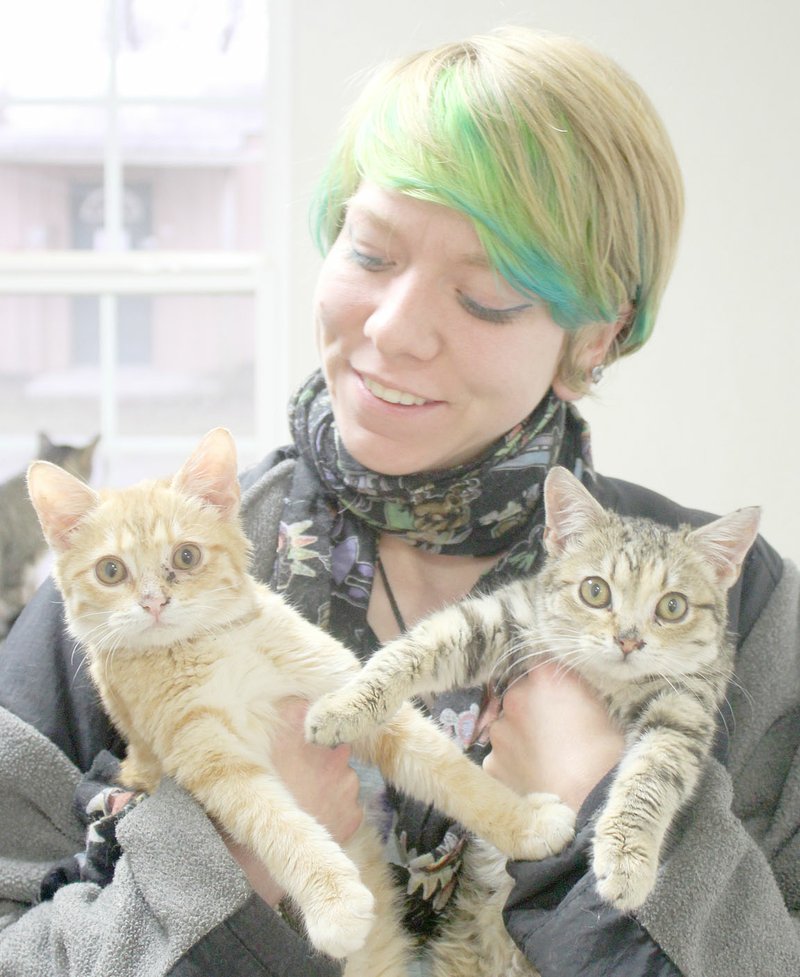A pair of kittens bounced around the Bella Vista Animal Shelter floor, taking turns chasing each other and batting at toys before heading back to the food bowl.
Playful as Olivia and Tessa might be, they both suffer a rare health condition called Megacolon; that is to say an enlarged colon.
Animal shelter executive director Deidre Knight-Matney said the kittens were brought in as a trio, but their third sibling was beyond saving after suffering an animal attack outside. The third cat's wounds became infested with maggots, she said, which spread to the siblings.
The kittens were brought in with him and bottle fed by shelter employee Beth Tichenor, she said, who was also stuck with the less-than-pleasant job of dealing with the maggots that had crawled into these two cats.
They seemed to be energetic and their demeanor was all right, Knight-Matney said, but they also appeared to be sick and were growing slowly, so they went to the vet's office. After an X-ray, she said, it was revealed that the kittens have enlarged colons, roughly the same size as one might expect on a 65-pound dog.
"We're going to try to treat them and reverse the condition," she said.
Becky Bynum, doctor of veterinary medicine with Hancock Veterinary Services, worked with these kittens and discovered the condition. Megacolon is extremely rare, she said, and this is the first time she has ever seen it in kittens -- though it has been successfully treated in adults, both medically and surgically, in the past.
The condition, she said, is marked by an extreme dilation of the colon and poor motility -- or the ability to move food through the digestive tract.
Roughly two-thirds of documented cases, Bynum said, are idiopathic -- which is to say the cause is unknown -- but in this case, it could be related to the maggot infestation these kittens suffered. Bynum said she believes the maggots damaged smooth muscle in the colon and this caused the motility issues that led to this health issue.
The kittens are currently being treated with a motility drug and a mild cathartic and stool softener, to which she's hoping the pair responds. Several documented cases, she said, have been euthanized because of a lack of treatment or the cost of treatment.
Currently, she said, she's giving the kittens a guarded prognosis, which is to say the kittens' condition is serious and outcomes are uncertain.
Bynum said she believed the shelter has done a great job of treating these animals.
Knight-Matney said that, while the outcome was uncertain, she feels it's worth seeing what can be done for these cats. If nothing else, she said, it can inform future decisions.
The treatment isn't particularly expensive, she said, coming in around $31 per month.
"We look at these animals just the way we would look at our own families," she said. "To us, a life is worth saving if we can save it, and we're willing to try."
There was a family interested in these kittens, she said, though the shelter has not heard from them recently and shelter staff isn't sure that they are still interested.
At this point, she said, the shelter is going to work on medicating these cats for the next few weeks. If there isn't a response, she said, the dosage may be increased.
"We want to give them a chance. That's what we're here for, to help the animals," she said. "We're going to keep our fingers crossed and hope for the best -- and maybe a Christmas miracle."
General News on 12/27/2017
